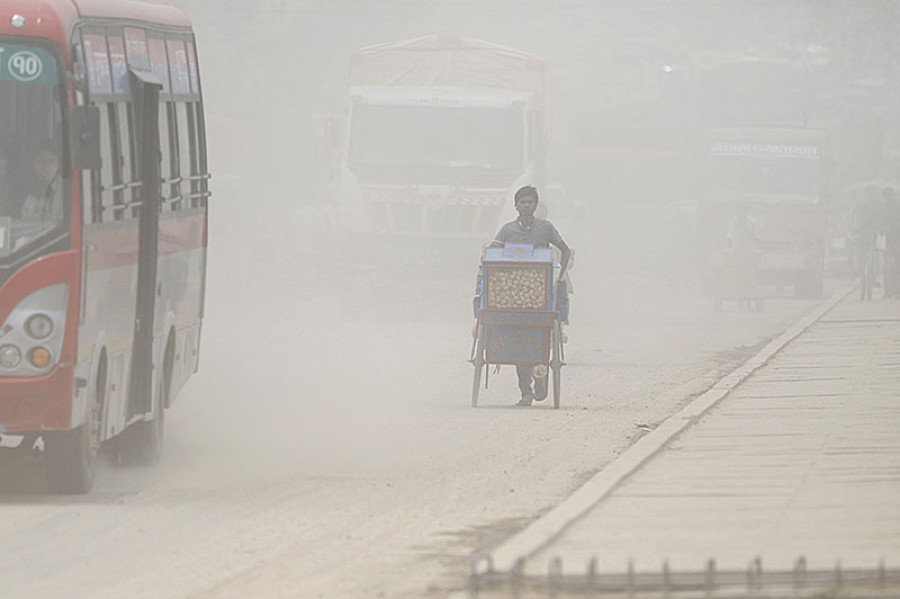Valley
Mayors’ Summit vows to fight Valley air pollution
Elected representatives of all local governments here on Thursday committed to jointly fight the Valley’s environmental degradation and the rising air pollution.
Elected representatives of all local governments here on Thursday committed to jointly fight the Valley’s environmental degradation and the rising air pollution.
Acknowledging air pollution as the common environmental problem in the Valley, mayors, deputy mayors, and the chiefs of the Environment Divisions of all the 18 Municipalities in Kathmandu Valley, including the two metropolises, on Thursday vowed to join hands and improve the air quality in the Valley.
The officials made the commitment at the event titled ‘Mayors’ Summit on Air Pollution’. Clean Energy Nepal (CEN), International Centre for Integrated Mountain Development (ICIMOD), Kathmandu Metropolitan City and Lalitpur Metropolitan City jointly organised the summit here on Thursday.
Speaking at the event, Lalitpur Metropolitan City Mayor Chiri Babu Maharjan stressed on collective efforts of all municipalities since air pollution affects all local governments equally.“Air pollution is a common problem for all municipalities. A single municipality alone cannot clean the air for valley dwellers. No matter how much good work municipalities do in other sectors, but if we fail to improve our environment then everything goes down the drain,” said Maharjan.
Kathmandu Metropolitan City Mayor Bidya Sunder Shakya said, “Improving roads that lead to landfill sites alone can improve the air quality here. Citizens often resort to burning waste during monsoons when civic staff is unable to collect garbage because of the poor condition of roads. This practice is one the major causes of increasing air pollution in Kathmandu.”
Vehicular emissions, brick kilns exhaust, dust emanating from construction sites and open burning of waste have been major contributors to the air pollution in the country, the summit heard.Other speakers said Kathmandu Valley receives poor air from other parts of the country that further exacerbates the poor air quality here.
Sharing similar experience of air pollution in Mexico City, once the most polluted city in the world, Mexico’s Ambassador to India and South Asia Melba Pria said Kathmandu Valley could learn from Mexico City’s experience in its fight against air pollution. In 1992, the WHO had declared Mexico the most polluted city in the world. Since then the capital city of Mexico has drastically improved its air quality with public and government initiatives.
“The air quality was so bad that sparrows were falling dead on the ground. It was killing our birds and children,” recalled Ambassador Pria. “So we started working on many programmes because we knew there was no quick fix to this problem.”
After working to improve the air quality through various activities like public initiative of ‘A Day without Car’, Mexico City succeeded in controlling air pollution. From one of the cities with worst air quality, Mexico City won the C40 City Award on Air Quality in 2013. Between 2008 and 2012, the city reduced 7.7 million tonnes of carbon emissions. The city noted an increase in days with good quality of air from eight to 248 with cleaner air in 1992.
“Our city looked like Kathmandu nearly 30 years ago, but not any longer. It took us more than two decades to reach here. We stopped open burning and improved our lifestyle and transportation sector. We did it with small steps that Kathmandu could also do. But every step should be measurable,” urged Ambassador Pria, adding, “Don’t wait until birds start falling from the sky.”
Environmentalist Bhushan Tuladhar reminded elected representatives they had come to power promising voters clean air and better environment during election campaigns. “During pre-election survey, majority of voters had said environmental pollution was the major problem in the Valley. Political parties and leaders had also promised improving the condition. Therefore, all the municipalities should come together to control air pollution,” said Tuladhar.
He suggested importing quality petroleum products and engines, maintaining vehicles, improving public transport and greenery that help the fight against air pollution.
Some mayors said the federal government should take the lead in controlling air pollution by boosting policies and implementing the existing laws. Mahalaxmi Municipality Mayor Rameshor Shrestha said the center’s role is crucial in changing policy to bring better fuels and engines as well as strictly enforcing the green sticker rule. Local government representatives urged banning old vehicles and burning waste in the open and better co-ordination with the federal government.




 9.89°C Kathmandu
9.89°C Kathmandu













